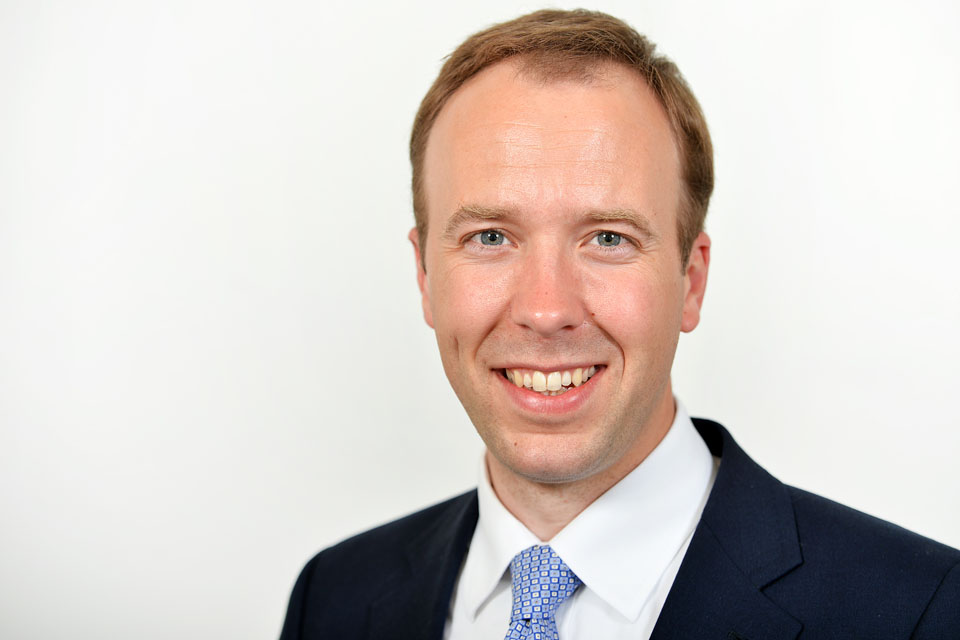International Women's Day: Matt Hancock speech
Minister for the Cabinet Office, Matt Hancock, gave a speech on increasing opportunities for women and ending single-sex shortlists.

It’s a great privilege to be here today with you all, and it’s a joy to be hearing from these inspirational public servants.
I’ve been an MP for nearly 6 years now, and I’ve spent a fair amount of time here in Portcullis House.
It’s named after a Tudor badge that has been the symbol for our Parliament for over 500 years. It denotes fortitude, strength and stability.
Castles and ramparts and gates have for millennia been erected to keep people out. That is a perception we must change.
In my first speech as Cabinet Office Minister I said that to govern modern Britain, the Civil Service has to be more like modern Britain.
Whether it’s a matter of social background, or gender, or ethnicity, or sexual orientation, we must end the injustice of unfair discrimination.
Indeed one of the reasons I’m in public service is because I passionately believe that everyone should have the chance to reach their potential, whatever their background.
I came to Westminster to fight for that principle and I intend to do so with every tool at my disposal.
I want my daughter to have every opportunity that my sons have. And like all of you here today, I pledge to do my duty to build a world in which all can succeed.
I’m proud of this great feminist cause, and I’m proud to call myself a feminist in making that pledge.
This is a moral quest. Indeed I believe it to be a self-evident, cornerstone British value.
We are all individuals with strengths, weaknesses, hopes and dreams. For each of us these things add up to the unique contribution that every one of us can make.
Yes, it’s a moral quest, but it is also deeply practical.
My core mission as Cabinet Office Minister is to help the government deliver more than the sum of its parts.
A crucial and integral part of that is opening our doors to the best talent, making sure all people have the opportunity to grow and excel.
It’s good business sense to bring in as many different ways of thinking as possible. Difference promotes innovation and strength.
International Women’s Day is a chance to hold up a mirror to ourselves. To do so we must take a good hard look at where we are, where we need to go, and how we get there.
So let’s look at where we are. Today, women make up 54% of our civil servants. A record 44% of new public appointments last year were women.
The Bridge report I commissioned recently found that we’re improving gender access to the upper echelons of the civil service.
Since the launch of the Talent Action Plan in 2014 we’ve improved support for returning mothers, increased the number of job shares, and put a halt to all-male interview panels.
But as you climb higher the numbers get worse. 60% of junior employees are women, but only 40% of the Senior Civil Service.
It’s striking that in 1996 – the year the portcullis was officially recognised as Parliament’s emblem – the figure was less than half that.
Research shows the gender pay gap is closing, and in some cases has closed.
We’re making progress, and this should be celebrated. But parity hasn’t yet been reached everywhere, and so there is more to do.
First, we must turn our commitment to equal opportunities in public leadership roles into meaningful action.
I want to see an end to single-sex shortlists and selection panels for public appointments. Whilst this is currently the case in the majority of competitions, I want it to be the standard across the board.
This shows we’re serious about gender parity, and I hope that the private sector takes notice and follows suit.
Next, our new digital advisory group for the government’s digital revolution is made up of 50% men and 50% women. And we intend to have more women on boards in the future.
I want more women to consider a career in the Civil Service, and I want those that are here to be proud of their job and their achievements.
So we’re going to make the selection and promotion process as transparent and fair as possible by tackling bias, conscious or otherwise, and making name-blind recruitment standard.
There’s a lot more to do, and I’m going to set out our full strategy to boost social mobility in the Civil Service in the spring.
So, to those storming the ramparts of injustice, I support you. Let us tear down these barriers to fairness for all.
Today is an important day but one day isn’t enough. We must make sure our top institutions are bastions of equality and opportunity.
They must be exemplars for the society we want to build. A society where everyone has the chance to succeed, and to serve their country.
And I hope that you too will continue to be standard bearers for that society.